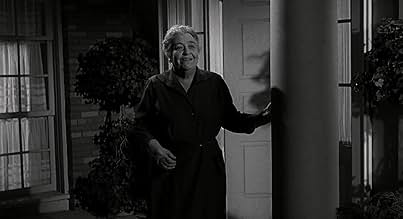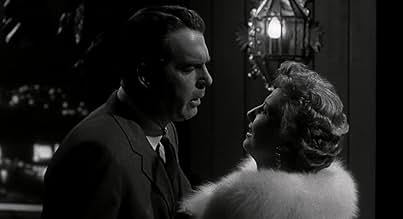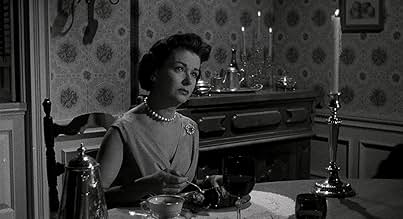अपनी भाषा में प्लॉट जोड़ेंWhen a toy manufacturer feels ignored and unappreciated by his wife and children, he begins to rekindle a past love when a former employee comes back into his life.When a toy manufacturer feels ignored and unappreciated by his wife and children, he begins to rekindle a past love when a former employee comes back into his life.When a toy manufacturer feels ignored and unappreciated by his wife and children, he begins to rekindle a past love when a former employee comes back into his life.
- निर्देशक
- लेखक
- स्टार
फ़ीचर्ड समीक्षाएं
MacMurray is a successful toy developer, Clifford Groves, married to Marion (Bennett), and they have three children (Reynolds, Perreau, and Nugent). Marion is preoccupied with the kids and the household, while MacMurray is longing for some alone time with her and to do something different - take a weekend off, go to the theater -- but something always happens that prevents it.
When Marion can't make a theater performance because of their daughter's dance recital, Cliff stays home alone. A woman who once worked for him, Norma Vale (Stanwyck) comes over to say hello. She's now a successful dress designer in from New York. He takes her to the theater instead, and then she asks to see his office.
When a planned weekend in the desert with Marion doesn't work out because one of the girls breaks her ankle, Marion insists that Clifford go without her and relax. There, he runs into Norma again. Unfortunately, his son (Reynolds) shows up and thinks Cliff and Norma are involved. He and his friends leave without making their presence known to his dad. Without realizing what's happening, Cliff is falling for Norma; and he doesn't know that she's always been in love with him.
This is a midlife crisis, '50s style, with the underpinning of the grass is always greener. That wasn't the original intention, of course - the original intention of the film is that Norma is lonely and would give up her wonderful career to have a family like Marion and Cliff have. People still feel this way, but today, it's more because of the road not taken, not so much because of dissatisfaction. Nothing's perfect, as the film shows us. Cliff sees Norma's freedom, the attention she pays him, her interest in his work. He feels in fourth place behind the kids to Marion. He's sick of being like the robot that is his latest toy. You wind him up, he works, he comes home, he has dinner, he goes to bed. With Norma he sees an opportunity for something different. Youth. To be put first. Endless possibility.
What a lovely movie, and I thought I was sitting down to some second feature. Instead, it has Sirk's magic touch and his sly criticism of the picture-perfect '50s American life. Frankly, I could have slapped the kids and Marion for not seeing what's in front of their faces, but to be fair, kids are self-involved, and Marion is completely committed to doing what she thinks is important for Cliff and their family.
Wonderful acting, with MacMurray as the frustrated Everyman, Bennett as an attractive, disciplined woman, and Stanwyck has someone who has earned wisdom the hard way, through hard work and disappointment.
Highly recommended.
While Sirk's films have often been branded "woman's pictures", "There's Always Tomorrow" is indeed very much a man's picture. It takes a hard and deep look at the role of the male breadwinner and the picture it comes up with is not a pretty one. What we are shown is a man who when young, courted the prettiest girl, married, had children and worked hard to build up a successful business. He is now middle aged and having achieved it all, begins to feel himself taken for granted by his wife and children. His needs are completely neglected. His wife has little interest in him sexually being totally wrapped up in fulfilling the unending needs of their self centered ungrateful children. It's a scenario all too familiar to millions of men. Fred MacMurrays's Clifford Groves has become a robot similar to the one his successful toy manufacturer has created. No wonder that Norma Vale's (Stanwyk) reappearance in his life presents an opportunity to regain his lost dreams. She's an independent career woman, who sees his situation as somewhat idyllic from the outside. But with the usual intelligence of a Stanwyk character, she has no illusions as to a possible future with him. Despite the brief and obligatory conciliatory ending, Clifford Groves' future does not bode well. It should come as no surprise that the film was not well received at the box office.
"There's Always Tomorrow" has many of the hallmarks of Sirk's craftsmanship. The studio refused to grant him his request for the film to be shot in color, despite having provided Universal with some of its highest grossing pictures of the decade. At least his demand for his favorite cameraman Russell Metty was granted. Metty as always, was the perfect partner in realising Sirk's vision. His interior filming in particular is a lesson in cinematography. He had a penchant for shooting characters behind banisters, framed in mirrors and caged behind fences to enhance the sense of their being trapped. MacMurray and Stanwyk are constantly gliding through dark shadow and bright light reflecting the inherent brightness and darkness in their lives.
At this point of writing "There's Always Tomorrow" has not been released in any format and rarely gets a showing on television. It's a gross injustice to an extremely important director and a wonderfully made, moving piece of cinema.
क्या आपको पता है
- ट्रिवियाAcclaimed documentary filmmaker Errol Morris named it as one of his 10 favorite films in the 2002 BFI Sight & Sound Poll.
- गूफ़Near the end, Vinnie is telling his girlfriend that he was wrong "about Norma and Cliff" in these exact words. But Cliff is his father; he wouldn't refer to his father by his first name.
- भाव
Norma Miller Vale: Love is a very reckless thing. Maybe it isn't even a good thing. When you're young and in love, nothing matters except your own satisfaction. The tragic thing about growing older is that you can't be quite as reckless anymore.
- साउंडट्रैकBlue Moon
(uncredited)
Written by Richard Rodgers and Lorenz Hart
Played on one of the toys and heard as a theme throughout the film
टॉप पसंद
- How long is There's Always Tomorrow?Alexa द्वारा संचालित
विवरण
- रिलीज़ की तारीख़
- कंट्री ऑफ़ ओरिजिन
- भाषा
- इस रूप में भी जाना जाता है
- Pasión otoñal
- फ़िल्माने की जगहें
- उत्पादन कंपनी
- IMDbPro पर और कंपनी क्रेडिट देखें
- चलने की अवधि1 घंटा 24 मिनट
- रंग
- पक्ष अनुपात
- 1.85 : 1
इस पेज में योगदान दें




































